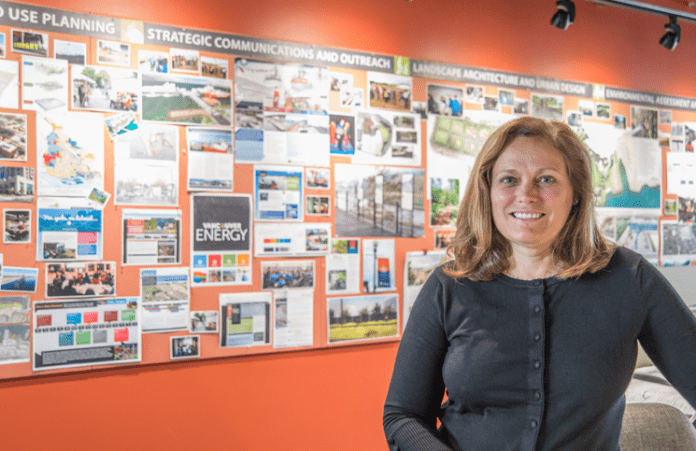“In our old office, there were no open work spaces,” said BergerABAM Vice President Helen Devery. “Particularly for our designers, landscape architects and engineers – I would see them wheeling back and forth across the hallways trying to work together.”
Started in 1951, BergerABAM is a prominent leader in the engineering and environmental consulting field. It occupied a downtown office space for more than two decades before recently moving to the dynamic office offered by the former City Hall space, which presented a unique opportunity for an office full of architects and engineers.
“It was raw space and we were able to design it with the building’s owners from scratch,” said Devery. “We hadn’t really thought we were going to move but the way we work is to provide integrated problem solving among our teams, so the open work space just seemed to fit.”
BergerABAM is headquartered in Federal Way and also has offices in Oregon, California, Texas and Nevada. The firm provides project management, construction management and support services worldwide, from Africa to the Panama Canal. The Vancouver staff is 31 strong, and hiring.
“We do things slightly differently here,” said Devery, highlighting the focus on landscape architecture and urban design in Vancouver that adds to the company’s signature civil and structural engineering projects.
Recent local, public space projects include the Port of Camas waterfront trail; a trail along Lower River Road in the Port of Vancouver; and part of the seven-acre waterfront area by the Red Lion Hotel. For the WSU Vancouver campus, BergerABAM has been involved in just about every building, according to Devery, from helping find the site to the environmental impact statement and all the permitting.
The Vancouver office boasts urban planners who work on permitting and development planning for comprehensive city plans; a natural resources team made of scientists; an environmental assessment team; and a strategic communications team.
Waterfront projects have become BergerABAM’s mainstay in the Pacific Northwest; some of its first undertakings here were for the navy and the ports of Tacoma, Seattle and Vancouver. From start to finish, BergerABAM designs, engineers and permits marine structures including piers, wharfs and industrial cargo terminals.
“We are one of the very few engineering firms that has engineers that are also qualified divers,” Devery added. “We have our own dive boat and our own dive team to do underwater inspections; that usually sets us apart for our waterfront projects.”
Beyond ports and waterfront, BergerABAM has a history of transit projects, though budgetary restraints delayed this work recently.
“One of the big challenges for us over the last year or so was transportation funding,” she said. “We design roads and bridges, so not having a transportation package was a challenge but now there are some projects that were funded.”
Legislative changes are another challenge BergerABAM regularly faces.
“Whether it’s a public sector client who wants to build a new road or bridge, or a private sector client who wants to construct a new export terminal, there are constant changes within the regulatory environment,” Devery said.
But the company has consistently maintained dominance in the field. Since BergerABAM has mostly non-residential, commercial and mixed-used projects that include federal and state funding, the company actually managed to grow during most of the recession, according to Devery.
The engineering and design innovation that BergerABAM is known for has continued to flow out of the new office. The company has several large-scale public and private sector projects on the horizon, including another contract with the navy that involves work in seven western states and continued work with their major client, Boeing, as well.
“The future continues to look bright,” said Devery.
Editor’s note: BergerABAM is a member of the Vancouver Business Journal’s Strategic Partners Program. To learn more about the program, contact Irene Pettengill at 360.448.6013.




